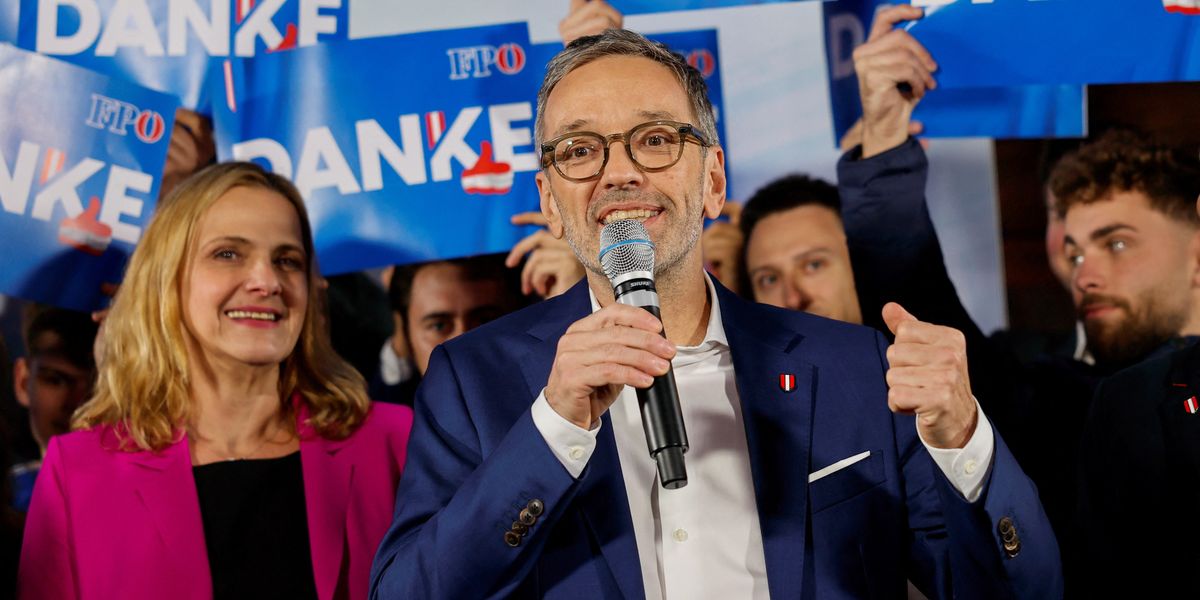Austria’s Historic Shift: The Rise of the Freedom Party (FPO)
In a significant political upheaval, voters in Austria have handed the hard-right Freedom Party (FPO) its first-ever general election victory, marking a pivotal moment in the country’s political landscape. Preliminary results indicate that the FPO, led by the controversial Herbert Kickl, secured approximately 29% of the vote, surpassing the ruling conservative Austrian People’s Party (OVP) by around 2.5 percentage points. This victory not only represents the FPO’s best electoral performance to date but also raises questions about the future direction of Austrian politics and its implications for Europe.
The Political Context
Both the FPO and the OVP campaigned on platforms emphasizing stricter asylum laws and a crackdown on illegal immigration. The FPO’s rise can be attributed to growing public concern over immigration and national security, issues that have resonated deeply with voters in recent years. Kickl’s hardline stance on immigration, which includes proposals for "pushbacks" at the border and the rejection of asylum applications from individuals who have traversed safe countries, has garnered significant support among those who prioritize national sovereignty and security.
However, the FPO’s victory is not without controversy. Kickl, who has faced criticism from other political leaders, finds himself in a precarious position as he seeks to form a government. The immediate rejection of coalition talks by other party leaders suggests that the FPO may struggle to translate its electoral success into effective governance.
Herbert Kickl: A Polarizing Figure
Herbert Kickl’s leadership of the FPO has been marked by a blend of populist rhetoric and hardline policies. His controversial past, including ties to a party founded by a former Nazi lawmaker, has led to widespread criticism and skepticism from opponents. Despite efforts to distance the party from its historical roots, the FPO’s legacy continues to haunt its public image.
Kickl’s policies extend beyond immigration; he has also expressed opposition to aid for Ukraine and called for the lifting of sanctions against Russia, arguing that such measures disproportionately harm Austria. This stance aligns with a broader trend among far-right parties in Europe that advocate for nationalist and isolationist policies.
Immigration and National Identity
The FPO’s campaign slogan, "Fortress Austria," encapsulates its approach to immigration and national identity. The party has promoted "remigration" policies aimed at preventing asylum seekers from obtaining citizenship and has called for rigorous checks on the citizenship status of naturalized Austrians. This focus on immigration has been fueled by high-profile incidents, such as the arrest of a teenager linked to a failed Islamic State-inspired attack in Vienna, which the FPO has used to bolster its narrative of a growing security threat.
Critics of the FPO argue that its rhetoric demonizes foreigners and fosters a climate of fear and xenophobia. Social worker Hedy, a refugee from Afghanistan, expressed concern over the party’s portrayal of asylum seekers as criminals, drawing parallels to the historical persecution of Jews in Austria. This sentiment is echoed by Alon Ishay, head of the Austrian Association of Jewish Students, who warns of the dangers of targeting specific groups based on nationality or religion.
The Future of Austrian Politics
As the FPO navigates the complexities of coalition-building, the future of Austrian politics hangs in the balance. Political science professor Kathrin Stainer-Haemmerle notes that if Kickl were to become chancellor, Austria’s role within the European Union could shift dramatically, potentially aligning more closely with the policies of Hungary’s Viktor Orban, a figure Kickl has openly admired.
The FPO’s ascent raises critical questions about the trajectory of democracy in Austria and the broader implications for European politics. Supporters argue that the party’s "Austria First" policies will address illegal immigration and stimulate the economy, while critics fear that such policies could lead to an increasingly authoritarian state.
Conclusion
The FPO’s historic victory in Austria’s general election signals a profound shift in the political landscape, reflecting broader trends of nationalism and populism across Europe. As Herbert Kickl and his party grapple with the challenges of governance and coalition-building, the implications of their policies will resonate far beyond Austria’s borders. The coming months will be crucial in determining whether the FPO can translate its electoral success into a stable government or if Austria will see a resurgence of more moderate political forces in response to the FPO’s hardline agenda.
